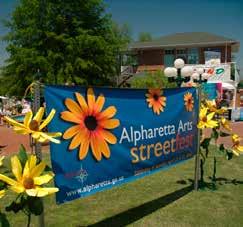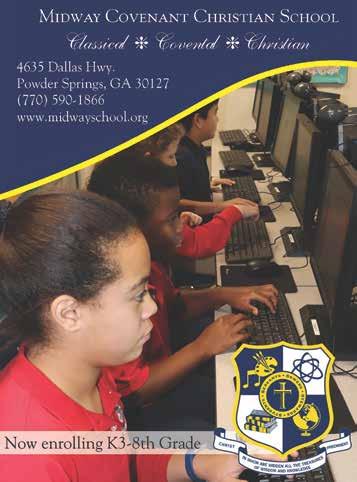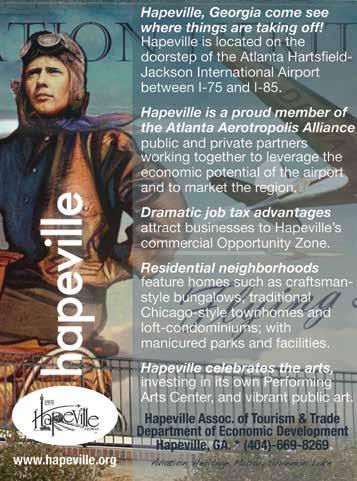
6 minute read
Homes and Communities
FAMILY-FRIENDLY NEIGHBORHOODS
FINDING THE PERFECT PLACE TO CALL HOME
By Susan Flowers
Relocating to a new city is always challenging. For families with children, that holds especially true. The process involves much more than finding a new home close to your new place of employment. Schools, the makeup of the neighborhood, leisure activities and many other factors need to be taken into account when choosing a place to call home.
“You really have to have a game plan,” says real estate agent Rhonda Duffy, who runs Duffy Realty of Atlanta and has been hailed as one of the top agents in the country by Realtor.com.
That plan begins with identifying specific areas of interest to families with children. If you already know you want to live within the Atlanta city limits, you’ve narrowed your search considerably. Atlanta neighborhoods have much to offer, like Virginia-Highland’s leafy, tree-lined streets, Midtown’s Piedmont Park and the Woodruff Arts Center (which includes the High Museum of Art) and Grant Park’s historic homes, park and Zoo Atlanta.
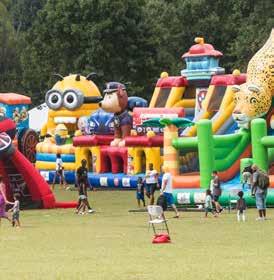
Giant inflatables during Fun Day at Piedmont Park
(Below Left) The Southeastern Railway Museum in Duluth is a family-friendly attraction, featuring many historic and vintage trains. (Below Right) Kennesaw Mountain National Battlefield Park in Kennesaw is a well-known Civil War historic site, with annual Civil War reenactments.

SUBURBS AND MIXEDUSE COMMUNITIES If you’re not tied to a particular section of town, your options increase dramatically. Many of Atlanta’s suburbs boast features of interest to families with children. Cities like Alpharetta, Marietta, Decatur, Duluth and Lawrenceville abound with greenspace, walkable downtown centers and other amenities.
Alpharetta, located in north Fulton County, is home to a historic downtown district, several parks, a weekly farmer’s market and Ameris Bank Amphitheatre at Encore Park, which hosts outdoor summer concerts.
In addition to a beautiful city square, Marietta’s attractions include the Gone With the Wind Museum and Kennesaw Mountain National Battlefield Park, a Civil War site with 17 miles of hiking trails. Decatur likewise radiates a cozy, small-town charm, especially around its historic courthouse and town square. Public transportation is easily accessible, and recreational activities are plentiful in its many parks and playing fields.
Just north of Atlanta in Gwinnett County, Lawrenceville features such attractions as the Aurora Theatre, the Gwinnett Stripers minorleague baseball team and numerous parks offering playgrounds, sports facilities and trails. Nearby Duluth boasts the 30-acre Southeastern Railway Museum, the Hudgens Center for Arts and Learning and the Infinite Energy Arena, home of the Atlanta Gladiators hockey team. Both cities are served by Gwinnett County Public Schools, recognized as one of the best school systems in the state.
One of metro Atlanta’s newest municipalities (incorporated in 2006), Johns Creek earns rave reviews from residents and national media alike for its quiet, safe atmosphere; excellent schools and excellent recreation opportunities, such as the Johns Creek Greenway. Its proximity to both Atlanta and to the North Georgia mountains gives residents the best of both worlds.
Other family-friendly suburbs worth considering include East Point, home to the Georgia Soccer Park and the Dick Lane Velodrome, one of the leading bicycle racing facilities in the country; Roswell, which features the Roswell Cultural Arts Center and the Chattahoochee Nature Center; and Sandy Springs, which boasts Heritage Green, a four-acre park that hosts free concerts and events.
Mixed-use neighborhoods, which allow resi-
DO YOUR HOMEWORK ON SCHOOLS
Neighborhood schools are, of course, a critical factor to consider. The Atlanta School Guide, Atlanta’s leading education resource for parents and educators, is a great place to start (atlantaschoolguide.com). Available for free at more than 850 locations across the metro Atlanta area, this semiannual publication offers features on educational trends, as well as important dates, helpful tips and terminology and detailed, up-to-date information on public and private schools, summer camps, early education centers and other educational resources.
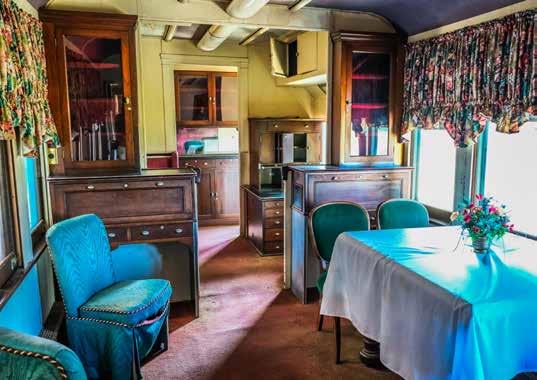
Suwanee's Town Center Park, located next to City Hall, includes 10-acres and a 1,000-seat amphitheater.
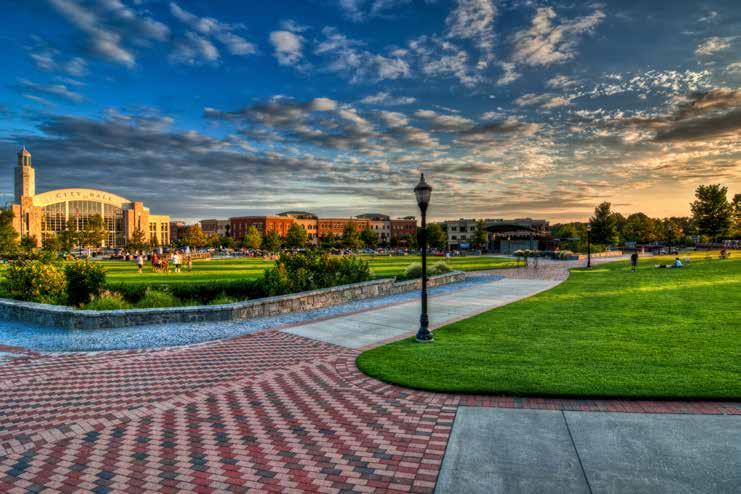
dents to live, work and play within the same area, are also worth considering, especially for families used to living in larger metropolitan areas. “A lot of mixed-use developments are attractive to younger families,” says Robin Lemon, a sales agent with Keller Williams Realty Consultants. “They want their children to experience more of a neighborhood feeling.”
Atlantic Station, in Atlanta’s Midtown area, is a 138-acre development offering an array of condos, lofts, townhomes, apartments and single-family homes, as well as a two-acre lake and plenty of greenspace, in addition to a mix of restaurants and shops.
In Suwanee, located in Gwinnett, the Town Center development features single-family homes, townhomes and condos, as well as retail and office space and the 10-acre Town Center Park. With abundant greenspace, an interactive fountain and a 1,000seat amphitheater, Town Center Park is referred to as Suwanee’s “front yard.”
Northwest of the city in Cobb County, Smyrna’s pedestrian-friendly Market Village sports an airy, open feel, with plentiful greenspace, a public square and fountain, charming townhomes, restaurants and retail and office space.
There are many, many more suburbs and communities worth a look as well. A good place to start is with a visit to Newcomer’s website (newcomeratlanta.com) and reading about the cities and areas profiled in our “Neighborhood Spotlight” and “Homes and Communities” sections to get a sense of what communities you’d like to explore further.
Kids enjoying a ride during one of Suwanee's festivals.
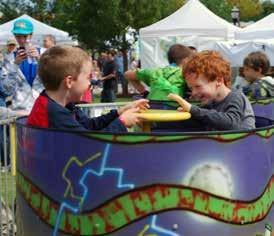
ASK QUESTIONS AND INVESTIGATE Once you’ve settled on a neighborhood, ask your potential new neighbors about the area. Duffy recommends seeking out three sets of neighbors and asking them all the same questions. For families with children, those include: How social is the neighborhood? Are there many parties or events? How many kids live in the area, versus how many adults? It’s important to establish whether a particular neighborhood provides sufficient opportunities to make friends with children of similar age.
It’s also a good idea to visit local shopping areas to ensure that there are child-friendly establishments and other retail outlets that fit your family’s lifestyle. A distance of only two or three miles can make a difference. And be sure to investigate any family-friendly amenities in the neighborhood. The fact that a subdivision has a pool, for example, doesn’t mean that the facility has room for all the residents to enjoy it on a regular basis, that there’s adequate seating around the pool or that sufficient safety measures are in place.
Your search should also be guided in part by the needs and interests of the children in your family. “Are they a computer family? What kind of sports do they play?” asks Lemon. “If the kids are really involved in certain things, I can start gearing a search toward the family’s needs. There are some families that will come in and say, ‘My children are very interested in volleyball or very into karate.’”
Most importantly, when scouting a new neighborhood and a new home, remember to take your time. “The key to buying a house is to ask a lot of questions and slow down the process,” Duffy says.
By having a detailed strategy, asking questions and placing special emphasis on neighborhoods and the amenities they offer, you’re much more likely to settle on the perfect home for yourself and your children.
Alpharetta’s Arts Street Fest is one of the city's many events.
